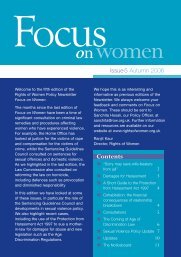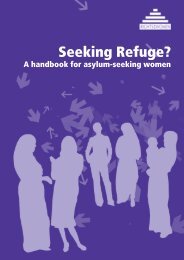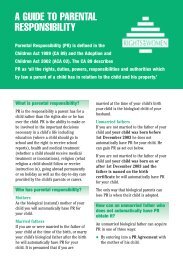DOMESTIC VIOLENCE, IMMIGRATION LAW AND - Rights of Women
DOMESTIC VIOLENCE, IMMIGRATION LAW AND - Rights of Women
DOMESTIC VIOLENCE, IMMIGRATION LAW AND - Rights of Women
You also want an ePaper? Increase the reach of your titles
YUMPU automatically turns print PDFs into web optimized ePapers that Google loves.
(b) They have adequate accommodation or the means <strong>of</strong> obtaining it, but cannot meet their<br />
other essential living needs.<br />
The applicant will have to show destitution as part <strong>of</strong> her application for leave to remain. This is<br />
likely to be very difficult. The UKBA Guidance believes that it will be ‘extremely rare’ for an<br />
applicant to be destitute. This is because people granted leave under the 10-year route will have<br />
permission to work. If they are granted leave to remain as a partner their partner will be expected<br />
to support them, and the partner will already have access to public funds. The Guidance states that<br />
an applicant claiming to be destitute ‘will need to provide evidence, including <strong>of</strong> their financial<br />
position, demonstrating that they do not have access to adequate accommodation or any means <strong>of</strong><br />
obtaining it (other than from a local authority or charity) or they cannot meet their other essential<br />
living needs (other than from a local authority or charity)’.<br />
• Other important requirements<br />
For all applicants admitted to the ’10-year route’, their applications for indefinite leave to remain<br />
(ILR) must show that they have passed the relevant English language test and have no unspent<br />
criminal convictions (see 2. Important new rules on criminality, below).<br />
However, if someone still has unspent convictions, or cannot pass the language test, they may be<br />
granted a further 30 months’ leave to remain.<br />
special cases:<br />
Those with current ‘partner’ visas (spouse, civil partner, unmarried partner) will continue on<br />
the current ‘settlement route’ to ILR (27 months’ leave followed by an application for ILR). But<br />
anyone applying for ILR after October 2013 will need to show English language to level B1 and not<br />
have any unspent criminal convictions.<br />
Those who have already been granted Discretionary Leave will continue to be dealt with<br />
under that policy through to indefinite leave if they qualify (normally through 2 periods <strong>of</strong> 3<br />
years’ Discretionary Leave). But anyone applying for ILR after October 2013 will need to show<br />
English language to level B1 and not have any unspent criminal convictions.<br />
Victims <strong>of</strong> Domestic Violence who would qualify under the existing Rules (have, or have had,<br />
a spouse visa, the marriage broken down during that spouse visa because <strong>of</strong> domestic violence)<br />
do not face any new requirements. The Domestic Violence rule is now in the new Appendix FM <strong>of</strong><br />
the Rules, in section DVILR 11 .<br />
A child born after leave to remain is granted to a parent, who can currently apply for leave in<br />
line with the parent, does not face any new requirements and continue to apply under para 305 <strong>of</strong><br />
part 8 <strong>of</strong> the existing Rules. (There is no specified form on which to apply for leave in line for a<br />
child and the UKBA has no clear procedure for dealing with these applications. To apply for leave<br />
in line for a child the applicant should write a short letter either to the address <strong>of</strong> the UKBA case<br />
owner who dealt with your own application (the address will be on the letter granting her leave to<br />
remain), or to the UKBA (leave in line), Lunar House, Wellesley Rd, Croydon CR9 2BY, giving the<br />
child’s name, nationality, date <strong>of</strong> birth, Home Office reference number and provide a photocopy <strong>of</strong><br />
her own grant <strong>of</strong> leave to remain, and an original long birth certificate for the child.)<br />
For those seeking to stay on the grounds <strong>of</strong> private life alone, the qualifying period for<br />
settlement is 20 years 12 (with some exceptions for those under 18 who have spent at least 7<br />
11 NB at the time <strong>of</strong> writing, these new rules appear to exclude women who had a spouse visa and then some subsequent<br />
visa before applying under the domestic violence rule. The requirement says ‘applicants whose last visa was a spouse<br />
visa’. However there was no intention to change the rule, and the UKBA have been asked to redraft this para.<br />
12 See Long Residence in part 7 <strong>of</strong> the Rules, at<br />
http://www.ukba.home<strong>of</strong>fice.gov.uk/policyandlaw/immigrationlaw/immigrationrules/part7/<br />
8
















